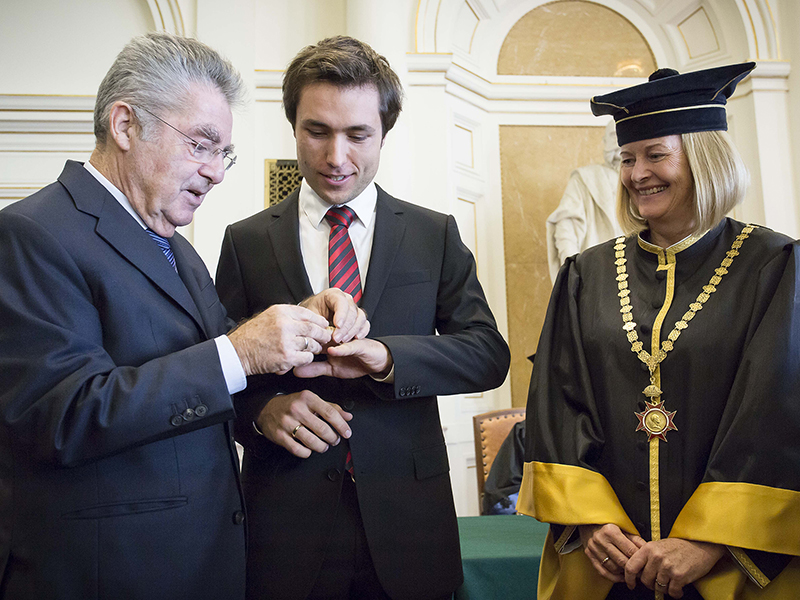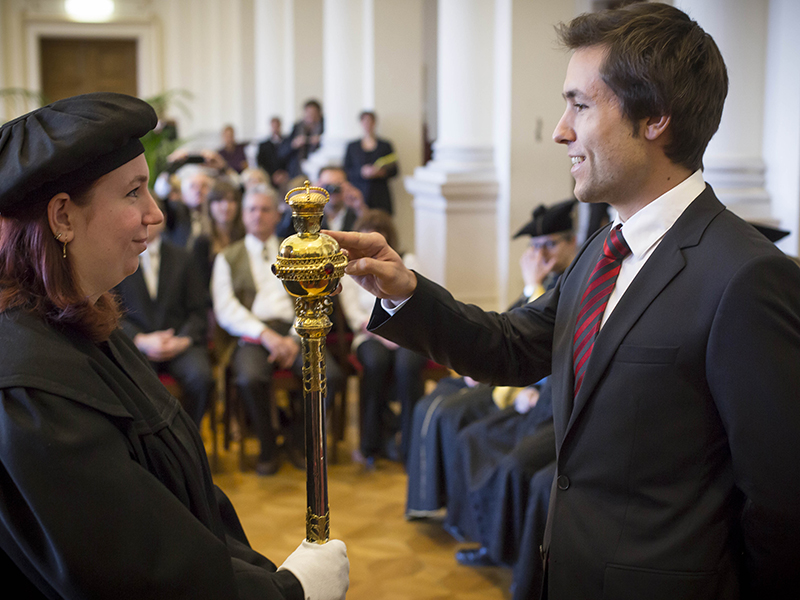Ausgezeichneter Erfolg in Schule und Studium, herausragende Dissertation: Wenn man eins und eins zusammenzählt, sind die Leistungen des Mathematikers Martin Holler „Eins A“. Der 27-jährige Forscher promovierte heute, am 6. Dezember 2013, an der Karl-Franzens-Universität sub auspiciis – in Anwesenheit von Bundespräsident Heinz Fischer.
„Diese außergewöhnliche Leistung ist ein Beispiel für Exzellenz und erstklassige Forschung, die zu den Kernaufgaben der Karl-Franzens-Universität zählen“, gratulierte Rektorin Christa Neuper dem Promovenden. Die Förderung des wissenschaftlichen Nachwuchses sei ein Auftrag, den die Uni Graz für die gesamte Gesellschaft erfülle.
Bundespräsident Heinz Fischer überreichte den Ehrenring der Republik und würdigte die ausdauernde Spitzenleitung: „Unsere Gesellschaft benötigt eine große Anzahl höchst ausgebildeter AbsolventInnen. Es ist daher wichtig, Vorbilder aufs Podium zu stellen.“
Besonders schwer getan hat er sich nie, gesteht Martin Holler. Das Lernen sei ihm stets leicht gefallen – im Besonderen die Mathematik.
„Mir gefällt der formale Aufbau der Mathematik. Auf Basis eindeutiger Definitionen werden Aussagen mit logischen Schlüssen bewiesen“, schildert Holler, aufgewachsen in Kaindorf an der Sulm.
Trotz aller notwendigen Formeln, Beweise und abstrakten Modelle ist dem Nachwuchsforscher, der am Institut für Mathematik und wissenschaftliches Rechnen der Uni Graz tätig ist, immer ein Aspekt wichtig: „Ich möchte auch konkrete Anwendungen aufzeigen.“ Und die standen in seiner – mit sehr gut benoteten – Doktorarbeit im Fokus.
Wer kennt das Problem nicht: Digitale Fotos, die „pixeln“ oder über eine minderwertige Auflösung verfügen. Holler hat in seiner Dissertation unter anderem eine Methode entwickelt, die es erlaubt, JPG-komprimierte Bilder zu rekonstruieren und verbessert darzustellen. „Die Rekonstruktion wird als Lösung eines mathematischen Minimierungsproblems gefunden, die durch ein Computerprogramm berechnet wird“, erklärt der frischgebackene Doktor. Ein Patentverfahren läuft. Derzeit ist er auch auf der Suche nach einem interessierten Unternehmen, das die Idee verwertet.
In der Forschung will Martin Holler auch weiterhin bleiben und beweisen, dass „seine Disziplin mehr als nur etwas für Exzentriker ist“. Diesem Klischee widerspricht der Sohn einer Mathematiklehrerin und eines Lokführers ohnehin: Denn neben viel Sport – etwa Laufen – entspannt sich der frisch verheiratete Steirer beim Kochen und auf seinen Reisen mit dem Motorrad.


